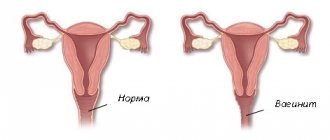Even in a person who does not have acute or chronic diseases of internal organs and systems, urine has a specific and unlike anything else smell. With normal functioning of the body, as well as sufficient fluid intake, a sterile solution of organic and chemical elements is removed from the bladder.
The appearance of a specific ammonia odor in urine in women of different ages indicates excessive accumulation of ammonium phosphates in the body, which indicates the development of a serious pathology.
In addition to the appearance of a sharp specific odor, urine may contain elements of pus, blood, as well as mucus and epithelial particles. Along with the sensation of an ammonia odor, some women may experience a sensation of itching and burning, which is associated with irritation of the mucous membrane of the external genitalia when urinating.
The smell of acetone in urine during pregnancy
The smell of acetone in urine in the morning while pregnant often occurs:
- If there is toxicosis with repeated and prolonged vomiting. While mild nausea and occasional vomiting in the early stages of pregnancy are normal, constant vomiting that prevents you from eating or even drinking water is a danger that requires an immediate visit to the doctor!
- If acetone is detected in the urine in the last stages of pregnancy, this is a reason for an urgent examination and even possible hospitalization of the woman.
Reasons for the appearance of acetone in the urine of a woman carrying a child:
- Malnutrition;
- Liver diseases;
- Diabetes;
- Anemia;
- Eating junk food;
- Insufficient fluid intake.
The most important and dangerous cause is diabetes.
During pregnancy, there are two types of it:
- The continuing development of an already existing disease is a banal weakening of the woman’s body and the inability to cope with the load.
- The gestational form is the so-called gestational diabetes. After the baby is born, glucose levels should return to normal.
What does ammonia smell like?
The gas has a sharp, specific odor, similar to the aroma of rotten eggs. To get an idea of what it smells like, you can smell ammonia, which is an ammonia solution.
When trying to sniff ammonia, you must be careful, keeping the open bottle away from your nose. Acute inhalation of vapors can cause headaches, watery eyes and nausea
There is always a small amount of ammonium phosphate in the urine. If urine sits for a long time, the element begins to decompose. A visit to a public toilet that is rarely cleaned can give you an idea of the ammonia odor.
What diseases are characterized by an ammonia smell in urine?
So, if you notice that the urine has a strong smell, is cloudy, contains foreign impurities, and causes pain when urinating, then the probable causes of the abnormalities may lie in the following pathologies of the genitourinary system.
- Urethritis: develops against the background of damage to the mucous membrane of the urethra by a bacterial infection. Often, blood clots can be seen in the urine, and the process of urination itself is accompanied by cutting pain in the lower abdomen.
- Cystitis: a fairly common disease in women, which is explained by the proximity of the internal organs to the urethral opening, through which the infection enters. As a rule, the disease develops against the background of reduced immunity due to hypothermia, taking certain medications, or damage to the body by bacterial/viral/fungal infections. Irritation of the bladder leads to a frequent urge to urinate, a feeling of incomplete emptying, and itching of the labia.
- Pyelonephritis (inflammation of the kidneys) or pyelitis (inflammation of the adrenal pelvis). Inflammatory processes of the urinary organs develop, as a rule, in the form of a secondary infection against the background of weak immune defense (as a result of hypothermia or infection of the body with pathogens). Often, the strong smell of urine appears against the background of acute pain in the lumbar region.
- Infectious diseases (chlamydia, gardnerellosis, vaginosis). Genital tract infections are common reasons why urine smells like ammonia. The proximity of the vaginal and urethral openings leads to the migration of pathogenic microorganisms and the spread of infection, resulting in changes in the color, smell and consistency of urine.
- Systemic diseases (diabetes, kidney and liver failure, hepatitis, tuberculosis, etc.) against the background of general malaise are manifested by cloudy urine and the appearance of a strong odor from the vagina.
- Malignant neoplasms. Tumors of various etiologies and localizations can cause urine to smell like ammonia and change color and consistency. Associated symptoms include: sudden weight loss, loss of appetite, general weakness, exacerbation of chronic diseases, etc.
- Prostate adenoma/prostatitis. In men, inflammation of the prostate gland can provoke a change in the smell of urine. As a result of the pathology, urine stagnation occurs and urination becomes difficult.
Due to the fact that the etiology of unpleasant urine odor is usually pathological in nature, you should not self-medicate, regardless of whether these symptoms manifest themselves in a child or an adult. Basic diagnostics (urinalysis) will allow you to identify the disease in the early stages and deal with it in a timely manner.
The urine of a healthy adult who drinks a sufficient amount of fluid during the day does not have a strong unpleasant odor, is transparent and is colored pale yellow.
If your urine smells like ammonia, acetone or stale fish, you should pay attention to your lifestyle: reconsider your diet, physical activity, etc.
Most people, when faced with a problem, wonder what to do when the urine smells unnatural. First of all, it is necessary to understand what caused the change in the chemical composition of urine.
The causes of unpleasant odor can be varied:
- prolonged urinary retention;
- insufficient consumption of clean water;
- kidney diseases;
- excessive amounts of protein in the diet;
- metabolic disorders;
- diseases transmitted during sexual contact.
Pathological causes
If the natural factors listed above are absent, and the urine still has an unpleasant odor, then this indicates a negative impact of the pathology developing in the body. The main causes are the following diseases:
Cystitis
The smell of ammonia in urine often appears due to inflammatory diseases of the mucous membrane of the bladder. As a rule, cystitis develops due to infections, but often the cause is ordinary hypothermia (swimming or winter walks in light clothing). Symptoms of the pathology depend on the form of the disease. If the stage is chronic, then the disease is manifested by frequent urges, sharp pain at the exit of the urethra, blood in the urine and heaviness in the bladder. If the acute phase is detected, then when urinating, cramps and pain in the abdomen are observed. Possible weakness. It takes longer to urinate due to pain. Another symptom of acute cystitis may be cloudy urine.
Urethritis
The most common cause of inflammation of the urinary system is the entry of pathogenic microorganisms. The manifestation of the disease is cutting pain, as well as changes in the characteristics of urine.
Pyelonephritis
Inflammatory processes in the kidneys caused by infection. Along with a change in the characteristics of the fluid that removes waste products from the body, symptoms such as fever, chills and lower back pain are observed. With inflammation of the kidneys, urinary disorders cannot be ruled out.
Venereal diseases
Infection and unpleasant odor of urine are two interrelated components. Changes occur due to inflammation of the genitourinary organs.
Diabetes
With this disease, the content of ketone bodies increases. Also, the reason for the change in smell is constant dehydration - one of the main symptoms.
Hepatitis
With an infectious lesion of the liver, a change in the characteristics of urine occurs. It becomes dark, and this appearance remains throughout the entire duration of the illness.
Metabolic disease
Another common reason. Metabolic disorders provoke various abnormalities that occur in the body. This also applies to changes in the properties of urine.
Also factors that cause changes in color and odor include tuberculosis and cancer pathologies. Do not forget that these diseases are often treated with medication. Medicines, as already mentioned, contribute to changes in the color and smell of urine. It may start to smell like acetone or ammonia.
Causes of ammonia in urine
The appearance of an unpleasant “ammonia” odor is not always a deviation from the norm. It can occur when eating hot, spicy foods rich in specific odors, poor drinking habits, as well as when the liver, urinary system organs, and other diseases are impaired. The reasons can be very diverse, regardless of age and gender.
The manifestation and intensity of such a symptom occurs at any age. Per day, 0.3-1.4 g of ammonia is physiologically released. But if the indicator is too high, the smell intensifies, which is a consequence of pathological changes.
Causes of ammonia odor in men and women:
- excessive consumption of protein foods. In this case, there are not enough enzymes to neutralize harmful compounds;
- prolonged retention of urine in the bladder. Some of the urea decomposes and gas is released, which is quite harmful to the body;
- dehydration, in which the concentration of urea increases;
- liver diseases (cirrhosis, hepatitis);
- tuberculosis of the genitourinary system;
- oncological diseases;
- sexually transmitted diseases and infections of the genitourinary system;
- diabetes mellitus, increased due to dehydration and accumulation of ketone bodies;
- kidney failure, in which the kidneys do not filter blood well;
- inflammatory processes of the bladder and excretory system (cystitis, urethritis)
- large consumption of asparagus in a short period of time.
Specific causes in women
The physiology of men and women is different, so the female body is more susceptible to the occurrence of ammonia odor.
Special causes of this symptom:
- menopause, during which the microflora changes and susceptibility to infectious diseases increases;
- bacterial infections of the female organs and genitourinary system arise due to the physiological features of the structure of the female body;
- use of medications and nutritional supplements during pregnancy. When taking vitamin supplements that contain B vitamins, calcium, and iron, an ammonia odor may occur. But this is a temporary effect that goes away after you stop taking them and does not pose a danger to a pregnant woman.
During the period of bearing a child, it is very important for a woman to maintain a water drinking regime in order to avoid dehydration. This is necessary to maintain the health of both the expectant mother and the baby.
Reasons for presence in children
Metabolic processes in a child's body occur more intensively than in adults. After birth, the baby's urine has neither color nor smell. But after introducing a diet of regular food, both appear. After a while, diapers or bedding soaked in baby urine begin to smell specifically of ammonia, which is a physiological reason.
If a child’s diet is incorrect, the child’s metabolism is disrupted; urine has a characteristic ammonia odor, which is formed due to:
- lack of water consumption during the day;
- excessive consumption of protein foods;
- eating foods high in synthetic dyes and additives.
In such cases, an ammonia odor may appear occasionally. To normalize metabolic processes, you should adjust the child’s diet, making it varied and natural
It is also important to maintain a drinking regime: the baby should drink the required amount of purified drinking water throughout the day.
When the smell of ammonia is felt not just once, but over a period of time, the reasons may be the following:
- infectious jaundice (Botkin's disease), in which urine acquires a dark color and a pungent ammonia smell;
- allergies accompanied by increased urea;
- pneumonia;
- anemia, which may be a consequence of the presence of parasites, frequent colds and infectious diseases.
Parents need to pay attention to the child’s condition, his behavior, control the temperature, and also track how long the smell of ammonia persists. And if ammonia fumes persist for a long time, contact your pediatrician as soon as possible
General information
In a healthy body, the aromas of urine are determined by its quantity, concentration, as well as the composition of chemical compounds that are filtered by the kidney system from the liquid components of the blood. In an adult healthy person, the daily volume of urine excretion should be at least 1.6-1.8 liters, and it should not have any aroma, provided proper nutrition is followed. When drinking coffee drinks, hot sauces with horseradish and garlic during the day, characteristic notes of urine aroma may appear, which is considered normal.
The concentration of urine, or the amount of water it contains, also has a significant impact on olfactory tones. It is worth noting that human urine begins to emit characteristic aromas when it is left for a certain period of time, even in a closed jar, the same effect is observed in the body cavity when urine is not removed from it for a long time.
During metabolic processes with amino acids, free ammonia can be released as a by-product, which in a healthy person, through the functioning of filtration processes, is converted into urea and excreted during urination.
If your urine smells like ammonia, it means it contains unconverted ammonia molecules, which indicates liver dysfunction. It should also be taken into account that urea can decompose into ammonia during reverse processes in the renal organ system, when the amount of urine begins to exceed permissible norms, that is, when it is retained in the body.
The smell of ammonia that appears over a certain period of time may indicate the development of pathological processes in the body, which are not recommended to be ignored.
Other causes of ammonia odor
Among other causes, diabetes mellitus is the most common.
Due to disturbances in the metabolism of carbohydrates and proteins, filtration and reabsorption in the kidneys are disrupted and urine acquires uncharacteristic aromas.
Diabetic women most often encounter the smell of not only ammonia, but also acetone - a sign of the accumulation of ketone bodies. Often this symptom is the reason to see a doctor and get examined.
Another common reason for the smell of ammonia is a variety of liver diseases. When functional failure of hepatocytes (liver cells) occurs, almost all levels of metabolic processes are disrupted, including protein metabolism, and ammonia and other metabolites accumulate. Typically, liver diseases are accompanied by itching, pain and heaviness in the right hypochondrium, yellowness of the skin and sclera, dark urine, light-colored feces. It is necessary to examine not only urine and kidneys, but also a biochemical blood test (so-called liver tests), ultrasound of the liver and some other examinations.
Cancer is, unfortunately, also a fairly common cause. More often, such a sharp and strong odor appears in advanced cases, when the process of tissue decay takes place.
Causes of non-sexual origin
If the smell of urine constantly haunts the patient, but she is sure that she could not catch a sexually transmitted disease, the cause of the problem lies in infection or inflammation. A sour or fishy smell of urine is caused by pathogenic bacteria that enter the body not only through sexual contact. They can infect humans through contact and household contact.
Changes in urine odor due to bacterial reasons are very dangerous. This symptom, insignificant at first glance, may indicate damage to the kidneys, bladder, or mucous membrane of the excretory system.
Pyelonephritis is an inflammatory process in the kidneys
Pyelonephritis and pyelitis
Pyelonephritis is an inflammatory process in the kidneys. It occurs when the immune system weakens. Bacteria, which are usually destroyed by the body, can easily spread throughout the body, causing inflammation. They can enter the kidneys both through the urinary system and through the blood. A symptom such as a strong odor of urine is characteristic of ascending type pyelonephritis, that is, when bacteria enter the kidneys from the bladder. The disease also occurs if there are stones in the ureters. The following symptoms are characteristic of pyelonephritis:
- lower back pain;
- intoxication;
- temperature increase;
- frequent urination.
Cystitis
Cystitis is another inflammatory disease of the urinary system. It affects the bladder mucosa. Inflammation is accompanied by severe pain in the pelvic area, which is especially pronounced when urinating. Instead of concentrated yellow urine, the woman produces fluid mixed with mucus or blood, although this symptom is not typical for all patients. Another feature of cystitis is frequent false urge to urinate.
The causes of this disease are unprotected sexual contact with an infected person, lack of personal hygiene, and hypothermia. A decrease in immunity can also trigger the development of inflammation. Weakening of protective mechanisms and, consequently, the development of cystitis sometimes occurs against the background of allergies, stress, injury or overwork.
Diabetes
The advanced stage of diabetes is characterized by a putrid smell of urine. It may resemble either the smell of acetone or the unpleasant aroma of rotten apples. In addition, the shade of the discharge changes. They become lighter and more watery. This is explained by the fact that diabetes provokes impaired kidney function and frequent urination. About 3 liters of fluid can be excreted through the patient's bladder per day.
Causes of ammonia odor
The main factors causing the smell of ammonia from sweat are divided into physiological and pathological. Physiological reasons are a sign of increased work of the body against the background of any stressful situation. The smell of ammonia appears as evidence that the excretory function of the body, with increased breakdown of metabolic products, is triggered on time and in full. In this case, after eliminating the factor, the main symptom immediately disappears.
Physiological factors
Sweating in diabetes Sweating in thyroid diseases
Typically, sweat has an ammonia smell in athletes who are on a special protein diet for active muscle growth. Increased physical activity provokes an increase in metabolism and active breakdown of nutrients. An ammonia odor may appear when:
- protein breakdown;
- nitrogen excretion;
- eating large amounts of acidic foods.
Not everyone follows the principles of proper nutrition before training.
Mandatory condition Any physical activity requires preliminary saturation of the body with slow carbohydrates - energy.
If there is not enough income, the body begins to use its own resources. If the technique is incorrect, it is not fat cells that are consumed, but your own protein—muscle tissue. Amino acid residues contain nitrogen. In the liver it breaks down into ammonia and urea. If its excretion through the liver is insufficient, the substance begins to be excreted through perspiration (sweating). This way the body is actively cleansed of harmful metabolic products.
Some nutritional supplements lead to dehydration. Then even the physiological content of protein in the body is accompanied by an ammonia odor. The liver cannot work at full capacity, so half of the work is performed by the excretory function of the sweat glands.
Acidic foods, especially fermented and pickled foods, increase the ammonia content in the body in addition to the breakdown of nitrogen. The substance has a detrimental effect on the nervous system, so the central nervous system tries to get rid of this metabolic product as quickly as possible.
Pathological causes
Every disease has its own smell. If your sweat smells like alcohol or ammonia, the cause is often due to the following pathological conditions.
- Mastopathy. The disease is typical only for the female half of the population and is characterized by pathological proliferation of the mammary gland ducts. The smell of ammonia usually appears in the armpits and does not depend on stress or physical activity.
- Diabetes. A chronic disease accompanied by multiple organ dysfunction. The main target organs of the pathology are the pancreas and liver. Micro- and macroangiopathy (impaired patency and functional capacity) affects the entire body, which causes the development of the main symptoms. The smell of ammonia does not appear immediately, but only when the liver cells are in a decompensated state. The organ cannot process nitrogen and remove harmful substances, so the sweat glands take over the work.
- Deficiency of vitamin D and B. The components take an active part in the metabolism of various classes. A lack of these vitamins often leads to impaired removal of ammonia from the body. Group B is responsible for nerve fibers; their deficiency can provoke pathological impulses, weakening resistance to stress, which is accompanied by active sweating. And vitamin D takes an active part in the work of liver cells.
- Tuberculosis. If there is active profuse perspiration, and the sweat smells of ammonia, and there are symptoms such as a dry or unproductive cough, fever, weakness and shortness of breath for a long time, you should contact a phthisiatrician.
- Problems with the thyroid gland. The ammonia smell from sweat in thyroid pathology is not the first symptom; it appears in the later stages. But the appearance of this symptom against the background of thickening and enlargement of the thyroid gland usually indicates a decompensated state, when the body can no longer independently cope with the problem and regulate heat exchange. An additional symptom may be brown or purple stains on clothes from sweat.
Prevention and treatment process
Treatment will depend on the causes. Lifestyle changes and diet will help make the odor go away.
Reducing your intake of vitamins and medications may also reduce urine odor.
Most people urinate rarely (less than 6 times a day). But urine that is retained for a long time can become concentrated and have an unpleasant odor. Frequent urination helps reduce the ammonia odor.
Personal hygiene will help get rid of the smell. It is necessary to cleanse the genitals well.
A discharge that deviates from the norm should alert a person and force him to make an appointment with a doctor.
Experts say the patient must pay attention to the daily diet, amount of food consumed, and medications taken
Infectious diseases require the use of strong antibiotics. Depending on the specific case, each drug is selected individually. This also applies to its dosage. When taking an anamnesis, the specialist takes into account the presence of an allergic reaction and the characteristics of the body. They can worsen the patient's condition and lead to surges in temperature and pressure in people of different ages.
Determining the color of urine
When a woman’s urine smells like ammonia, this is a serious reason to go to the antenatal clinic, get tested, and cleanse the body. The procedures are carried out to prevent the spread of sexually transmitted infections. The patient is required to bring a sexual partner for examination; diseases are sexually transmitted. The likelihood of cure decreases with unprotected sex.
The lack of adequate therapy, the appearance of concomitant diseases and problems will lead to consequences such as infertility or disturbances in the functioning of the excretory system.
Men should also pay attention to the smell of urine; this will allow them to collect information about the development of serious pathologies and infectious diseases that affect the functions of the reproductive system. Urine in men and its characteristics - indicators of their health
Once the correct diagnosis has been established, therapeutic measures can begin to eliminate the causes and symptoms of the disease. Treatment depends on the pathology that caused the ammonia odor in urine. Medicine is not yet able to eliminate the manifestations of some hereditary diseases. If it is impossible to determine the origin of the increase in ammonia levels, specialists use pathogenetic treatment aimed at correcting the mechanisms of its metabolism.
Etiological
In the case of polyetiological hyperammonemia, when the pathology is caused by several factors at once, it is difficult to select therapy to eliminate all causes. Treatment is often combined with symptomatic or pathogenetic methods.
The most effective treatment is considered to be the treatment of infectious processes caused by pathogenic microorganisms. To stop them, depending on the type of pathogen, antibacterial or antiviral drugs are prescribed.
For pyelonephritis, cystitis, urethritis, based on the severity of the inflammatory process, the following antibacterial agents can be prescribed:
- Fluoroquinolones (“Zoflox”);
- Broad-spectrum penicillins (“Benzylpenicillin”, “Amoxicillin”, “Augmentin”);
- Cephalosporins 1-5 generations (“Cefuroxime”, “Ceftazidime”, “Suprax”, “Cefepime”, “Ceftaroline”);
- Macrolides (“Erythromycin”, “Azithromycin”);
- Tetracyclicines (“Doxycycline”).
In the fight against viruses, two types of drugs are used, some are aimed at suppressing their growth and reproduction (Acyclovir, Orvirem, Arbidol), the second stimulate the immune system (Viferon, Interferon).
Symptomatic
Treatment aimed at eliminating the manifestations of hyperammonemia involves the prescription of drugs to maintain the functioning of the liver and kidneys, as well as normalize processes in metabolic pathologies. It is recommended to reduce protein foods in the diet, drink enough fluid, regularly empty the bladder, and careful hygiene of the genitals.
Normal physiological manifestations
Quite often, when asked why urine smells like ammonia in women, one can answer that this is caused by objective physiological reasons not related to pathology. The following factors not related to diseases of internal organs can be identified:
1Excessive consumption of foods containing protein often causes ammonia to appear in the urine. The fact is that proteins, when they enter the body, are easily broken down into amino acids, which, as noted, release ammonia during metabolism. 2 Insufficient drinking regimen leads to dehydration of the body.
As a result of insufficient fluid intake, the water content in the urine decreases. Urine becomes more concentrated and darker in color. It usually acquires the smell of ammonia, although another unpleasant, pungent aroma (for example, acetone) may also appear. 3Prolonged retention of urine in the bladder leads to an unpleasant smell of urine.
In this case, there is a direct relationship: the longer the delay, the stronger the smell. Basically, this phenomenon occurs when the urge to urinate is forced to be restrained due to the impossibility of doing so (for example, in transport, theater, etc.). Such exposures, if occurring too frequently, can cause urinary system diseases.
4Purely female reasons for the phenomenon under consideration include the period of menstruation. Changes in hormonal levels combined with changes in the vaginal microflora contribute to the appearance of anomalies. A similar phenomenon can be expected upon the onset of menopause. 5 During pregnancy in women, the appearance of a pungent urine odor of various types (including ammonia) can be considered a common fact.
There are many reasons for its appearance: hormonal changes, changes in microflora, hypotension, lifestyle, dehydration (caused by both lack of water consumption and toxicosis), unhealthy diet. 6Metabolic disorders can be caused by uncontrolled use of certain medications. An ammonia smell appears when using products based on calcium and iron. This effect can be caused by excessive consumption of a number of vitamins.
The physiological mechanism of changes in the properties of urine must obey the following basic conditions: short duration of manifestation, rapid restoration of the norm when the cause is eliminated, the absence of additional alarming signs, and most importantly, pain during urination
Characteristics of the phenomenon
The smell of a liquid depends on several factors - volume, composition, concentration. It is known that it is formed by the kidneys through blood filtration. Eating certain foods may cause changes in the color and odor of your urine. The olfactory shade has a factor of urine concentration - the amount of chemicals in a certain volume of water. Ammonia in the human body acts as a product formed during the breakdown of amino acids. During normal functioning of the body, the liver promotes the rapid conversion of the element into urea, which leaves the body naturally. Therefore, if this smell is present in the urine, this is a clear indication of problems with the liver.
Whatever happens, discharge with the smell of ammonia in women should be alarming signals for going for an examination.
Do pathologies affect the smell of urine?
Reasons why urine smells like acetone
- urethritis is a pathology associated with inflammation of the urethra. Bacteria or viruses infect the walls of the urethra, therefore, in addition to an unpleasant odor, purulent or bloody impurities may appear.
- acidosis. Not every patient is aware of what this disease means. If a person is fasting, oxidation occurs in his blood caused by a lack of carbohydrates. Urine becomes saturated with ketone bodies and acquires the smell of ammonia.
- malignant neoplasms. In the case of an oncological process, the consistency, shade of urine and the way it smells change.
- pyelonephritis is a kidney disease of bacterial origin. Accompanied by severe nagging pain in the lower back and an increase in body temperature.
- liver failure. With this serious pathology, the level of alkaline phosphatase is sharply increased. The urine of patients is colored not light yellow, but brown-green, and in addition, the discharge begins to smell unpleasant.
- diabetes. The urine of sick people often smells like ammonia due to the presence of ketone bodies in the discharge.
- inflammation or adenoma of the prostate gland. In this case, urine output may be difficult. Its stagnation in such diseases leads to the appearance of an unpleasant odor.
- inflammation of the bladder (acute cystitis). It develops mainly in women, due to the specific structure of the urethra. Urination is accompanied by a burning sensation, the urine smells bad and acquires a cloudy consistency.
Often, an ammonia-like smell in urine may not indicate any problems. For example, if a person seasons food with a lot of spices or eats a lot of asparagus, the smell of urine can change to a specific
A healthy man's urine has a faint odor. A specific odor occurs when there are problems in filtration and concentration of the liquid. In addition, failure is possible in other internal organs.
Ammonia smell
Appears during the decomposition of amino acids. In the body they turn into urea, which is excreted along with urine. When this element accumulates in large quantities in the liver, the liquid acquires a specific odor.
The following can lead to high levels of uric acid:
- lack of fluid;
- consumption of foods with large amounts of protein;
- long course of treatment with medications containing iron and calcium.
In this case, there is no need to worry. It is enough to eliminate the listed factors, and soon the unpleasant aroma will go away on its own.
Car oil smell
Formed during phenylketonuria. Characterized by a violation of the metabolic process of phenylalanine. The disease leads to problems in the central nervous system and protein metabolism.
Passed on by inheritance. If you do not start timely treatment and do not follow a low-protein diet, the patient’s well-being worsens. The man begins to lag behind in mental development. To avoid this, newborn babies are given diagnostic tests.
In addition to physiological pathogenesis, the smell of stale eggs can appear during inflammatory processes in the kidneys and urinary tract. It also occurs with a malignant neoplasm in the rectum.
Smell of acetone
It is a bad sign, most often indicating the development of diabetes mellitus, and may also indicate stomach cancer. Sometimes it appears under the influence of physiological factors:
- consumption of large amounts of meat;
- alcohol poisoning;
- heavy physical activity.
Smell of cat urine
Appears when there are disturbances in the leucine metabolic process. This indicates B-methylcrotonoylglycinuria, a genetic disease.
Men's fragrance
The smell of male sweat is almost never a cause for concern, just minor discomfort. Urine has a specific smell due to high testosterone levels, but the smell should be faint. With excessive consumption of alcohol, it becomes sharper.
Strange smell of urine in pregnant women
Why does ammonia-smelling urine occur in pregnant women? The enlarged uterus during pregnancy puts pressure on the ureters, and the hormone progesterone relaxes the muscles of the ureter and bladder. This causes stagnation of urine, and such urine is an excellent breeding ground for bacteria and the development of urinary tract infections. But urine smells like ammonia in pregnant women not only during infections. Almost all hormones released for the growth and development of the fetus inhibit the activity of insulin, which disrupts the absorption of glucose and its metabolism in the body. This condition is called gestational diabetes. It goes away after childbirth. In addition, during pregnancy, a woman may experience an exacerbation of chronic liver diseases, which is responsible for the conversion of ammonia into urea.
When urine smells like ammonia in women
An unusual aroma of urine can appear at any age. The characteristic smell of ammonia occurs when ammonium phosphates accumulate in a woman’s body. Not only the “aroma” of urine changes, but also its composition, sometimes mucus, pus and blood appear. Such symptoms always indicate diseases of the urinary system.
Even if, in addition to a specific smell, there are no other warning signs, an examination will still not be superfluous.
The normal amount of urine in women is from 1.5 to 2 liters per day. When fresh, it does not smell of anything, but some food products, for example, asparagus, can give it an unusual aroma.
The concentration also depends on the volume of liquid drunk. If urine sits in a container for some time, even if it is closed, it will develop a characteristic aroma. The same thing happens if urine is retained in the bladder.
Preventing changes in urine odor
In order not to provoke the development of an unpleasant aroma of urine in a woman, it will be necessary to begin taking preventive actions during the preparation period. The following rules must be adhered to:
- Remove from your diet all foods that can negatively affect the smell of urine.
- If you have discharge, you should use panty liners, which should be changed every day.
- use only natural fabrics (cotton) for wearing underwear.
- Introduce a variety of foods into your diet to saturate your body with all the necessary nutrients.
- Perform genital hygiene every day immediately after waking up and before going to bed.
Thanks to the correct implementation of the recommendations, the specific smell of urine will not bother a woman while she is waiting for the birth of her child.
Thus, to find out whether the smell of urine in a patient changes during pregnancy, it is recommended to familiarize yourself with the possible reasons. To prevent possible development factors, you should follow simple rules of prevention.











